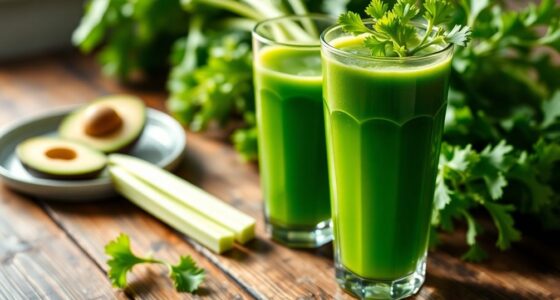Cranberry juice is a nutritious option during pregnancy, rich in antioxidants and essential vitamins like C, E, and K1. It's safe to consume throughout all trimesters and can help prevent urinary tract infections by stopping bacteria from adhering to the urinary tract. Plus, it supports hydration and dental health. Opt for unsweetened varieties for the best benefits. Learn about other ways cranberry juice can enhance your pregnancy experience and promote overall well-being.
Key Takeaways
- Cranberry juice is safe during pregnancy and can be consumed in all trimesters without adverse effects.
- It is rich in antioxidants and essential vitamins, aiding in overall health and hydration.
- Regular consumption may help prevent urinary tract infections by preventing bacteria from adhering to the urinary tract.
- Cranberry juice supports dental health, providing nutrients that strengthen teeth and gums.
- Opt for unsweetened varieties to manage sugar intake, especially for those with gestational diabetes.
Nutritional Value and Health Benefits of Cranberry Juice
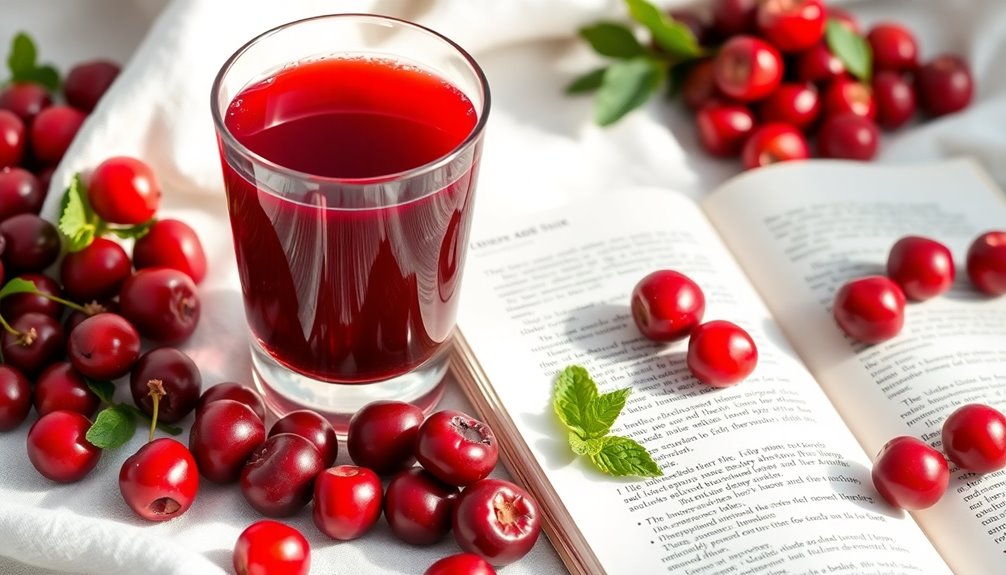
When you consider the nutritional value of cranberry juice during pregnancy, you'll find it packed with health benefits that can support both you and your baby.
This juice is rich in antioxidants, particularly proanthocyanidins, which help reduce inflammation and boost immune health. It contains essential vitamins and minerals like vitamin C, E, and K1, all vital for fetal development and your overall health.
With about 90% water content, cranberry juice aids in hydration, an important factor during pregnancy. Its high fiber content supports digestive health and can help relieve constipation, a common issue for many expectant mothers.
Additionally, regular consumption may help prevent bacteria from adhering to the urinary tract, reducing the risk of urinary tract infections (UTIs).
Safety of Cranberry Juice During Pregnancy
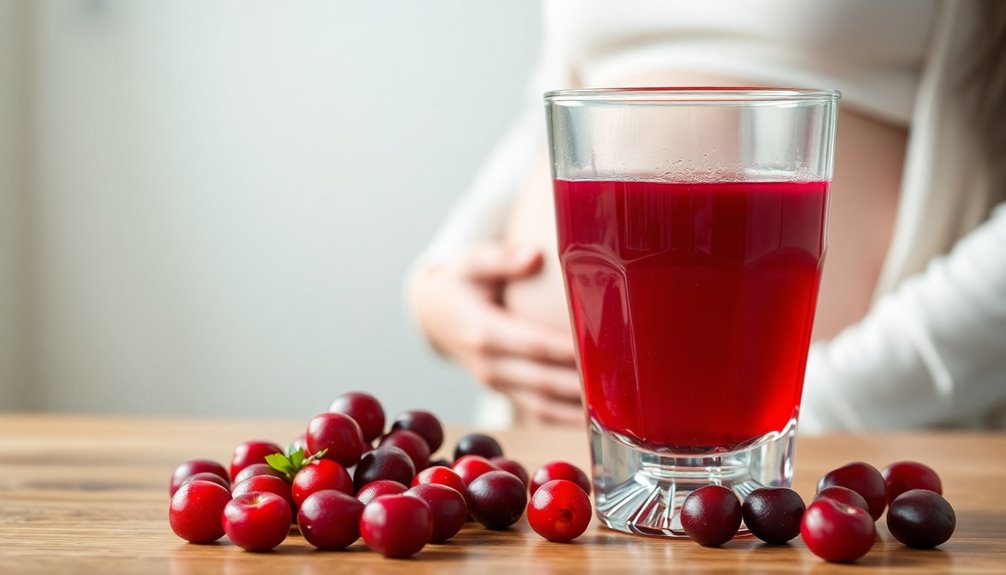
Cranberry juice is considered safe for you during all trimesters of pregnancy, with numerous studies supporting its benefits without adverse effects on pregnancy outcomes.
Research shows that cranberry juice can help prevent urinary tract infections (UTIs) by stopping bacteria from sticking to the bladder and urinary tract. A significant 2013 study involving over 68,000 pregnant women found no risks associated with cranberry juice, enhancing its reputation as safe during pregnancy.
While it aids in UTI prevention, remember it's not a substitute for medical treatment—always consult your healthcare provider if you suspect a UTI.
To manage your sugar intake, opt for cranberry juice without added sugars, ensuring you reap the health benefits of cranberry without unwanted extras.
Cranberry Juice and Urinary Tract Infections
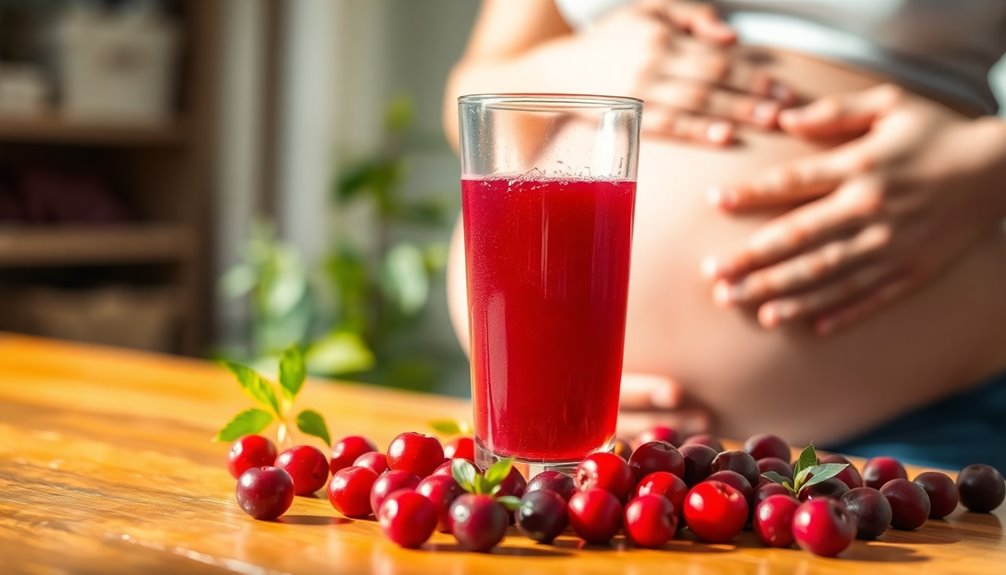
Urinary tract infections (UTIs) can be a common concern during pregnancy, but incorporating cranberry juice into your diet might help lower your risk.
Cranberry juice may prevent bacteria from adhering to the bladder and urinary tract, making it a useful ally in preventing urinary tract infections. A 2008 study showed a 41% reduction in UTIs among women consuming cranberry juice, and a larger study in 2013 found no risks associated with its use. However, while cranberry juice can be beneficial, it’s important to consider cranberry juice potential side effects. Some individuals may experience gastrointestinal discomfort or allergic reactions, particularly if they consume it in large amounts. As with any supplement, moderation is key, and it’s advisable to consult with a healthcare professional before using cranberry juice as a preventative measure for urinary tract infections.
However, it's important to remember that cranberry juice during pregnancy isn't a treatment for existing infections. Always seek medical care if needed.
Additionally, watch out for cranberry juice products high in added sugars, especially if you're managing gestational diabetes. Opt for options that are low in sugar and high in fiber. Mushroom coffee's adaptogenic properties can also be beneficial in reducing stress, which may indirectly support urinary health during pregnancy.
Cranberry Juice's Role in Dental Health

While maintaining good dental health during pregnancy is essential, adding cranberry juice to your diet can make a significant difference. Cranberries are packed with vitamin C, calcium, and magnesium, all vital for strong teeth and gums. Their antibacterial properties help prevent tooth decay and plaque buildup, reducing the risk of cavities. A handful of cranberries or a glass of cranberry juice daily can greatly benefit your dental health.
| Nutrient | Benefits | Sources |
|---|---|---|
| Vitamin C | Supports cell protection | Cranberries |
| Calcium | Essential for teeth and gums | Cranberry juice |
| Magnesium | Prevents gum disease | Cranberries |
| Antibacterial | Helps reduce plaque buildup | Cranberry juice |
Incorporating cranberry juice can support your dental health during this important time.
Cranberry Juice for Digestive Health and Constipation Relief
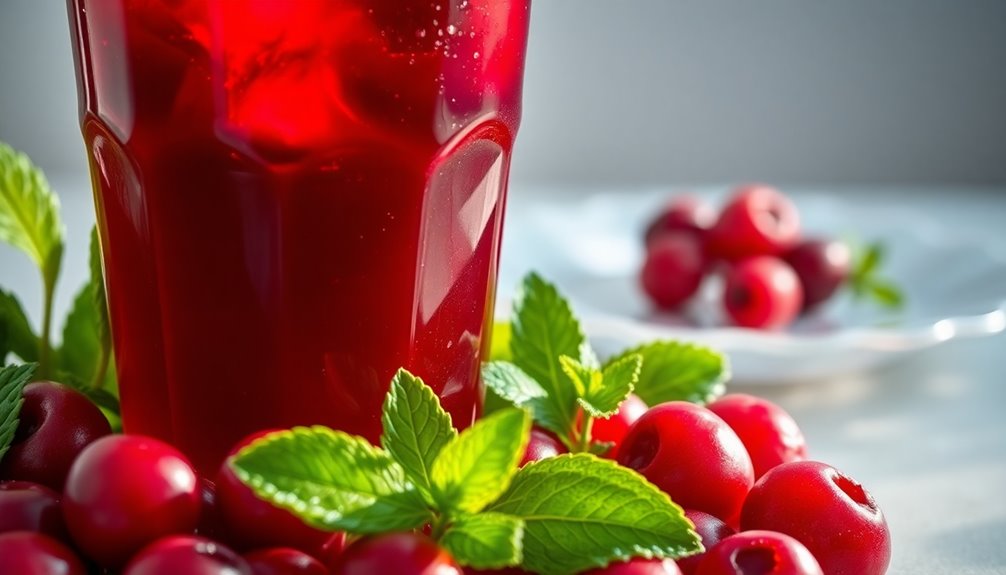
Maintaining regular digestion can be a challenge during pregnancy, but incorporating cranberry juice into your diet can help ease constipation.
Cranberries are high in fiber, promoting gastrointestinal function and providing constipation relief. The natural fiber content in cranberry juice helps soften stool, making it easier to pass through your intestines.
Regular consumption of cranberry juice can mitigate the digestive discomfort many pregnant women face due to hormonal changes and prenatal vitamins. Plus, with cranberry juice containing 90% water, it aids in hydration, which is essential for healthy digestion.
A handful of cranberries or a serving of juice each day serves as a natural remedy, helping you stay comfortable and regular during this important time.
How to Incorporate Cranberry Juice Into Your Pregnancy Diet
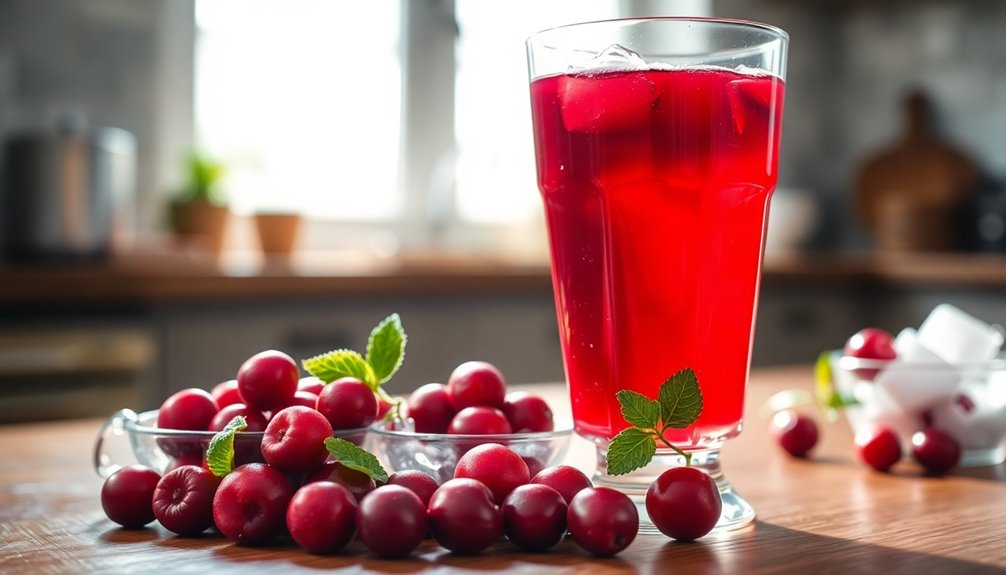
Cranberry juice not only helps with digestion but can also be a flavorful addition to your pregnancy diet. Here are some easy ways to incorporate it:
- Sip on daily cranberry juice, ensuring it's unsweetened to manage gestational diabetes.
- Blend cranberry juice into smoothies with yogurt and fruits for a nutritious boost.
- Mix unsweetened juice with sparkling water for a revitalizing, hydrating drink that can help prevent UTIs.
- Whip up homemade salad dressings by combining cranberry juice with olive oil and vinegar for a tangy, nutrient-rich dressing.
You can also prepare homemade cranberry sauce with reduced sugar to enjoy alongside meals.
These options let you benefit from cranberries, which are high in proanthocyanidins, helping prevent bacteria from adhering.
Frequently Asked Questions
Is Cranberry Juice Good for Getting Pregnant?
Cranberry juice can be beneficial when you’re trying to get pregnant. Its antioxidants, particularly proanthocyanidins, support reproductive health by promoting blood flow and reducing inflammation. Moreover, cranberry juice may also help balance urinary health, which is essential when considering conception. The benefits of cranberry juice for sex extend beyond reproductive health, as improved blood circulation can enhance overall sexual performance and enjoyment. Incorporating this nutrient-rich beverage into your diet is a delicious way to support your journey toward pregnancy.
The high vitamin C content helps with iron absorption, which is essential if you're at risk of anemia. Plus, cranberry juice may improve egg quality and maintain urinary tract health, lowering infection risks that could hinder conception.
While it's not a treatment, it can complement a healthy diet for fertility.
Does Cranberry Extract Help With Smell?
So, you're hoping cranberry extract will magically turn you into a super-smeller?
While it won't give you the nose of a bloodhound, it does contain antioxidants and anti-inflammatory properties that might help your nasal health.
Some studies suggest it could support a clearer sense of smell, especially if you're dealing with congestion.
Just don't ditch your doctor—consult them for personalized advice on whether cranberry's your secret weapon for sniffing out scents!
What Juices Should Be Avoided in Early Pregnancy?
In early pregnancy, you should avoid unpasteurized fruit juices, as they may harbor harmful bacteria.
Steer clear of juices high in sugar, like sweetened fruit cocktails, to help manage weight and gestational diabetes.
Also, watch out for juices with high acidity, such as grapefruit juice, since they can interact with medications.
Finally, completely exclude any alcoholic beverages, including juice-based cocktails, to protect your baby's health.
Always consult your healthcare provider for personalized advice.
Does Cranberry Juice Help Dilate?
You might think sipping on cranberry juice could be like waving a magic wand for cervical dilation, but it isn't.
While its potential to prevent UTIs is well-known, there's no scientific evidence linking cranberry juice to dilation during pregnancy.
Your body's hormones and natural processes play a much more significant role in labor.
If you're curious about what to consume, it's best to chat with your healthcare provider for tailored advice.
Conclusion
Incorporating cranberry juice into your pregnancy diet can offer numerous health benefits, from supporting urinary tract health to aiding digestion. As the saying goes, "an ounce of prevention is worth a pound of cure." So, enjoy this delicious drink in moderation, and consult your healthcare provider to confirm it fits your needs. With its vibrant flavor and potential perks, cranberry juice can be a invigorating addition to your journey towards motherhood!
Cindy thoroughly researches juicing trends, techniques, and recipes to provide readers with practical advice and inspiration. Her writing style is accessible, engaging, and designed to make complex concepts easy to understand. Cindy’s dedication to promoting the advantages of juicing shines through her work, empowering readers to make positive changes in their lives through the simple act of juicing.




